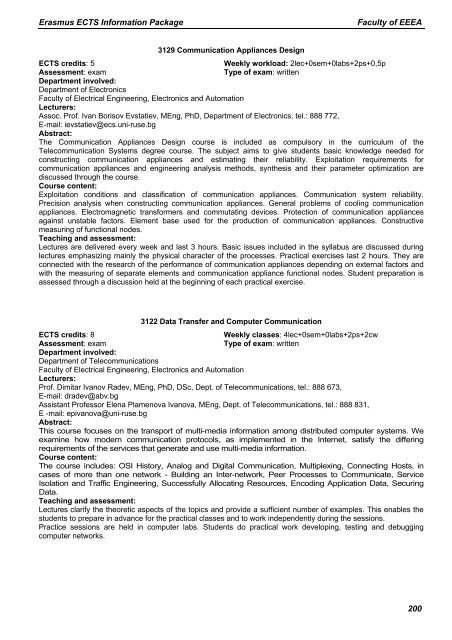Erasmus ECTS Information Package
Erasmus ECTS Information Package
Erasmus ECTS Information Package
You also want an ePaper? Increase the reach of your titles
YUMPU automatically turns print PDFs into web optimized ePapers that Google loves.
<strong>Erasmus</strong> <strong>ECTS</strong> <strong>Information</strong> <strong>Package</strong><br />
Faculty of EEEA<br />
3129 Communication Appliances Design<br />
ЕСТS credits: 5<br />
Weekly workload: 2lec+0sem+0labs+2ps+0,5p<br />
Assessment: exam<br />
Type of exam: written<br />
Department involved:<br />
Department of Electronics<br />
Faculty of Electrical Engineering, Electronics and Automation<br />
Lecturers:<br />
Assoc. Prof. Ivan Borisov Evstatiev, MEng, PhD, Department of Electronics, tel.: 888 772,<br />
Е-mail: ievstatiev@ecs.uni-ruse.bg<br />
Abstract:<br />
The Communication Appliances Design course is included as compulsory in the curriculum of the<br />
Telecommunication Systems degree course. The subject aims to give students basic knowledge needed for<br />
constructing communication appliances and estimating their reliability. Exploitation requirements for<br />
communication appliances and engineering analysis methods, synthesis and their parameter optimization are<br />
discussed through the course.<br />
Course content:<br />
Exploitation conditions and classification of communication appliances. Communication system reliability.<br />
Precision analysis when constructing communication appliances. General problems of cooling communication<br />
appliances. Electromagnetic transformers and commutating devices. Protection of communication appliances<br />
against unstable factors. Element base used for the production of communication appliances. Constructive<br />
measuring of functional nodes.<br />
Teaching and assessment:<br />
Lectures are delivered every week and last 3 hours. Basic issues included in the syllabus are discussed during<br />
lectures emphasizing mainly the physical character of the processes. Practical exercises last 2 hours. They are<br />
connected with the research of the performance of communication appliances depending on external factors and<br />
with the measuring of separate elements and communication appliance functional nodes. Student preparation is<br />
assessed through a discussion held at the beginning of each practical exercise.<br />
3122 Data Transfer and Computer Communication<br />
<strong>ECTS</strong> credits: 8<br />
Weekly classes: 4lec+0sem+0labs+2ps+2cw<br />
Assessment: exam<br />
Type of exam: written<br />
Department involved:<br />
Department of Telecommunications<br />
Faculty of Electrical Engineering, Electronics and Automation<br />
Lecturers:<br />
Prof. Dimitar Ivanov Radev, MEng, PhD, DSc, Dept. of Telecommunications, tel.: 888 673,<br />
E-mail: dradev@abv.bg<br />
Assistant Professor Elena Plamenova Ivanova, MEng, Dept. of Telecommunications, tel.: 888 831,<br />
E -mail: epivanova@uni-ruse.bg<br />
Abstract:<br />
This course focuses on the transport of multi-media information among distributed computer systems. We<br />
examine how modern communication protocols, as implemented in the Internet, satisfy the differing<br />
requirements of the services that generate and use multi-media information.<br />
Course content:<br />
The course includes: OSI History, Analog and Digital Communication, Multiplexing, Connecting Hosts, in<br />
cases of more than one network - Building an Inter-network, Peer Processes to Communicate, Service<br />
Isolation and Traffic Engineering, Successfully Allocating Resources, Encoding Application Data, Securing<br />
Data.<br />
Teaching and assessment:<br />
Lectures clarify the theoretic aspects of the topics and provide a sufficient number of examples. This enables the<br />
students to prepare in advance for the practical classes and to work independently during the sessions.<br />
Practice sessions are held in computer labs. Students do practical work developing, testing and debugging<br />
computer networks.<br />
200
















